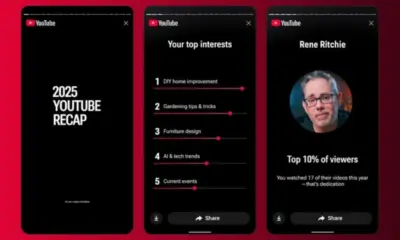Science
Millennials Can Learn from Gen Z’s Innovative Learning Styles

The education landscape is evolving rapidly, with Gen Z and Gen Alpha leading the charge. Their unique learning styles, shaped by technology and digital interactions, offer valuable insights for older generations, particularly Millennials, who may still rely on traditional educational methods. This shift is not merely a trend; it reflects a fundamental change in how knowledge is acquired and processed.
Understanding the Shift in Learning Preferences
Joseph Wilson, co-founder of the legal education platform Studicata, emphasizes that these younger generations are digital natives. While Millennials grew up alongside the internet, Gen Z and Gen Alpha have been immersed in technology since early childhood. “They were raised with iPads, YouTube, and streaming platforms,” Wilson explains. This environment has led to a preference for video-based education, making platforms like TikTok and YouTube integral to their learning experiences.
These platforms serve as primary tools for grasping new concepts. Short-form content on TikTok, for example, has become a go-to for quick lessons, while long-form videos on YouTube provide deeper dives into complex subjects. The reliance on video as a learning medium is not a sign of distraction but rather a strategic adaptation to available resources.
Rethinking Educational Structures
The trend towards video and bite-sized learning does not imply a decline in the quality of education. Instead, it suggests a necessity for a restructured approach to lesson planning. Traditional 60 to 90-minute lectures can feel overwhelming to students who are accustomed to quick, engaging content. Wilson notes that educators may need to break lessons into shorter, modular segments that contribute to larger learning objectives.
“Micro-lessons aren’t the enemy of mastery,” he asserts. When designed effectively, they can enhance engagement and focus. However, Wilson cautions that relying solely on video can create a uniform learning experience that fails to address individual student needs. Unlike a live instructor, video lacks the ability to adapt in real time to a student’s questions or confusion.
Gen Z’s approach to learning is not chaotic; it is methodical. Students are leveraging various formats—audio, visual, and interactive—to find what works best for them. Wilson observes that they expect content to be dynamic and engaging, and that artificial intelligence (AI) can play a crucial role in providing educational material in diverse formats.
Ensuring Depth in Learning
A significant challenge remains: ensuring that preferred content formats still promote deep understanding. Just because something is popular on platforms like TikTok does not mean it lacks rigor. Wilson highlights the need for a dual strategy in teaching that meets students where they are while also pushing their intellectual boundaries.
This means presenting material in varied formats while simultaneously encouraging analysis and discussion. Teachers are tasked with designing assessments that test genuine understanding rather than rote memorization. Innovative methods might include oral assessments, collaborative projects, and in-person discussions that require real-time thinking.
Looking to the future, Wilson envisions a learning environment increasingly dominated by video and AI. As new digital natives enter educational systems, expectations for flexible and engaging learning experiences will intensify. AI tools are already emerging that can customize educational content, offering multiple formats of a single lecture tailored to individual learning preferences.
While AI presents opportunities for personalization, it is essential that outputs are verified, particularly in specialized fields. Wilson believes in the collaborative potential of AI as a supportive tool guided by expert design, enabling students to engage critically with their learning materials.
The generational divide in learning styles should not be viewed as a barrier but rather as an opportunity for growth. By embracing the adaptable, resourceful nature of Gen Z, Millennials and educators can foster improved educational systems that meet the needs of all students.
In a world where information is abundant, being flexible and format-agnostic may just be the key to the future of education.
-

 Politics4 weeks ago
Politics4 weeks agoSecwepemc First Nation Seeks Aboriginal Title Over Kamloops Area
-

 World5 months ago
World5 months agoScientists Unearth Ancient Antarctic Ice to Unlock Climate Secrets
-

 Entertainment5 months ago
Entertainment5 months agoTrump and McCormick to Announce $70 Billion Energy Investments
-

 Science5 months ago
Science5 months agoFour Astronauts Return to Earth After International Space Station Mission
-

 Lifestyle5 months ago
Lifestyle5 months agoTransLink Launches Food Truck Program to Boost Revenue in Vancouver
-

 Technology3 months ago
Technology3 months agoApple Notes Enhances Functionality with Markdown Support in macOS 26
-

 Lifestyle3 months ago
Lifestyle3 months agoManitoba’s Burger Champion Shines Again Amid Dining Innovations
-

 Top Stories2 months ago
Top Stories2 months agoUrgent Update: Fatal Crash on Highway 99 Claims Life of Pitt Meadows Man
-

 Politics4 months ago
Politics4 months agoUkrainian Tennis Star Elina Svitolina Faces Death Threats Online
-

 Sports5 months ago
Sports5 months agoSearch Underway for Missing Hunter Amid Hokkaido Bear Emergency
-

 Politics5 months ago
Politics5 months agoCarney Engages First Nations Leaders at Development Law Summit
-

 Technology5 months ago
Technology5 months agoFrosthaven Launches Early Access on July 31, 2025





















